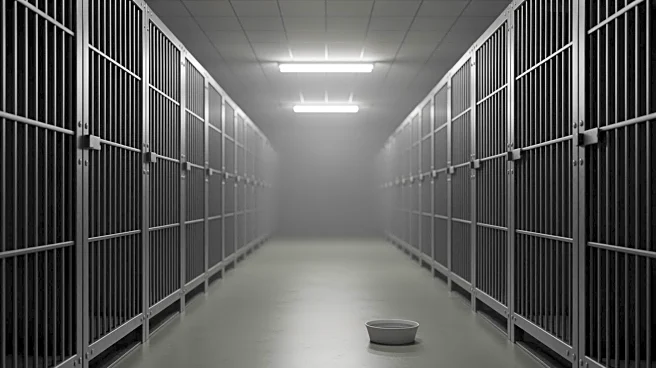What's Happening?
Tricolor Holdings, a major auto lender in California and Texas, has filed for Chapter 7 bankruptcy, revealing significant financial exposure for several banks and investment firms. The company's bankruptcy filing lists assets and liabilities in the range of $1-$10 billion. Tricolor had obtained financing from JPMorgan, Fifth Third Bank, and Barclays, with JPMorgan reportedly having about $200 million of exposure. Fifth Third Bank expects a non-cash impairment charge of $170-$200 million related to Tricolor. BlackRock is also expected to post losses due to Tricolor's involvement in the asset-backed securities market, where securities issued by Tricolor are now trading at significantly reduced values. This development underscores the growing risks in the auto lending sector, particularly concerning subprime borrowers and used-car loans.
Why It's Important?
The bankruptcy of Tricolor Holdings serves as a critical indicator of the vulnerabilities within the auto lending industry, which could have broader implications for the banking sector. Auto loans represent a significant portion of banks' credit portfolios, and the deterioration in this segment could lead to increased nonperforming loans and financial instability. The situation highlights the potential for cascading effects on banks with substantial exposure to retail lending and structured credit markets. As auto loan balances constitute a large share of the sector's total capital, the fallout from Tricolor's bankruptcy could pressure banks to reassess their risk management strategies and lending practices.
What's Next?
The bankruptcy of Tricolor Holdings may prompt banks and financial institutions to reevaluate their exposure to auto lending and asset-backed securities. Stakeholders might anticipate increased scrutiny and regulatory oversight in the sector, potentially leading to tighter lending standards and risk assessment protocols. Banks with significant exposure may need to adjust their financial strategies to mitigate potential losses and safeguard their capital. Additionally, the situation could lead to broader discussions on the stability of the banking system and the need for reforms to address emerging risks in consumer lending.
Beyond the Headlines
The collapse of Tricolor Holdings could trigger a reassessment of the structured credit market's transparency and reliability, particularly concerning the rating of asset-backed securities. The rapid devaluation of AAA-rated securities raises questions about the accuracy and robustness of credit ratings, potentially leading to calls for more stringent evaluation criteria and oversight. This event may also influence consumer confidence in the auto lending market, affecting borrowing behavior and demand for auto loans.









